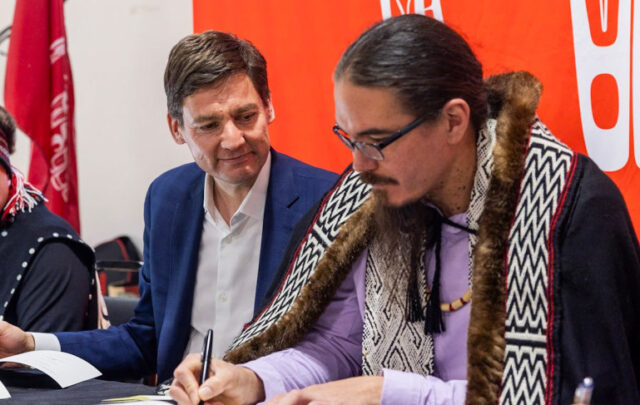When Mia Hernandez signed up for classes to earn a Leadership and Social Change (LSC) certificate at California’s De Anza College, she thought she would be attending a series of lectures. Instead she found a unique combination of classroom interaction among students and professors, along with hands-on experience as a change agent in her community. Over the course of the program, Hernandez has participated in local projects that involved migrant children and families, political lobbying, a role in student government, and organizing around equity issues.
As Hernandez worked two jobs on and off campus as a full-time student, “the LSC program kept me grounded between all the demands on my time,” she recalls. “And it gave me the building blocks for the career skills I’m developing now as a transfer student in community studies at UC Santa Cruz.”
Hernandez’s experience has special relevance today as the nation weathers a deep political divide. Now more than ever, progressives are looking to their own communities to create and grow solutions. Searching for ways to reconnect and renew, a non-profit organization called the Community Learning Partnership is providing students, instructors, and community groups a model for preparing the next generation of local leaders and activists.
Over the past seven years, CLP has established a national network of community change studies programs, which offer students accredited courses in community organizing at colleges like De Anza. Today, CLP has more than 300 students enrolled in seven sites across the country, according to CLP Executive Director Ken Rolling. More than 75 percent of these students are people of color and come from low-income backgrounds. Nearly 15 percent have experienced homelessness personally.
More than an exercise in academic study, CLP’s programs are designed to give students the knowledge and skills they need to become leaders in revitalizing their local communities. In the process, CLP aims to renew the practice of participatory democracy—especially in marginalized or distressed areas.
Hernandez, for example, is currently participating in No Place Like Home, an ongoing collaboration between UC Santa Cruz and the local community, capturing stories of renters, families, community organizations, landlords, and developers to illustrate the area’s housing crisis. She is also exploring field study opportunities that address affordable housing and renters rights issues in San Jose.
Addressing the progressive-leadership gap
CLP founder Andy Mott spent more than 35 years at the Center for Community Change, a national nonprofit helping grassroots groups in their local communities. “Over the years, I saw that progressive leaders [primarily white males] from the ’60s and ’70s were retiring,” Mott explains. “This created a big gap in finding and cultivating the next generation of leadership—especially among people of color and from low-income areas.”
With a grant from the Ford Foundation, Mott left CCC to explore ways of blending leadership knowledge with the practical skills of organizing locally to effect change. He found Denise Fairchild, who, since 1999, has been partnering with the Community Development Technology Center (CDTech) in Watts and South Central Los Angeles. She had built the kind of program model Mott was searching for.
“The community college is a key catalyst to creating a pipeline of skilled, capable local community leaders,” says Fairchild, who serves as co-chair of CLP’s steering committee. The program she helped develop with CDTech gives students with a passion for community organizing a place and a career pathway where they can learn by doing.
“We educate our students in a program that’s one part therapy, one part knowledge, one part organizing, and one part technical planning,” she explains. “In many cases, we have to first encourage them to overcome any cynicism they feel about the ways things operate, and give them a sense of optimism about how they can effect change in their own backyard.”
The CDTech program has graduated more than 3,000 individuals to date, many of whom have gone on to careers in community organizing as well as founded their own nonprofit organizations.
With inspiration and lessons learned from CDTech, CLP has so far developed programs in 12 community and four-year colleges across the United States, including a partnership with the Minneapolis Community and Technical College.
Lena Jones, a political science instructor at MCTC, teaches core courses developed in conjunction with Syd Beane of the Native American Community Development Institute that enable students to earn an associate’s degree in community development.
“CLP embraces a holistic vision that’s inclusive rather than the typical academic specialization,” Jones says. “We work with other academic departments, with city and county government, and local nonprofits to supply internships for our students, guest speakers in the classroom, and in co-organizing local events.”
CLP courses at MCTC offer open enrollment with no GPA or academic requirements outside of a GED or high school diploma. Jones noted that many CLP students transfer to four-year colleges to continue their education, and nearly all participate in local community organizing. One student, for example, is a policy aid to the mayor of Minneapolis, while another works for environmental justice at the Center for Earth Energy and Democracy. Some students have started their own businesses or nonprofits, such as a recovery house for addicts and a housing cooperative for Native Americans.
“We want students to understand their own personal story,” Jones explains, “and what kind of change they want to see in their communities. As a teacher, it’s so rewarding to engage with passionate people who want to connect with their communities, and help them discover the confidence and skills to make it happen.”
Expanding the role of college in community
As president of De Anza College in Cupertino and a co-founder of The Democracy Commitment, Brian Murphy considers CLP at the forefront of helping students develop their leadership potential. CLP provides a core curricula that can be adapted to each college’s specific culture and community, says Murphy, and a national network of support and connection for participating college faculty.
Located in the heart of Silicon Valley, De Anza reflects the diversity of the region, with Latino, Asian, white, and African American students. Many are first generation, immigrant, and working class, and commute long distances to attend a college that emphasizes both academics and social engagement. Community colleges typically emphasize preparation for the labor market, Murphy says, but he believes it’s critical to teach students more than technical, vocational, or job-specific skills.
More than a third of American undergraduates are enrolled in community colleges. “Our colleges have an obligation to give students a way to participate in their communities, and learn to work collaboratively with their neighbors to help solve very complex problems,” Murphy says.
“That’s actually what employers are looking for in graduates these days,” he says. “And why programs like CLP are so important to facilitating the social, entrepreneurial, and political skills students want and need to effect change.”
Investing in future community leaders
To help fund its expansion over the years, CLP has obtained grants from the W.K. Kellogg Foundation, which invests in programs that benefit vulnerable children and families—concentrating on many of the cities where CLP now operates.
“CLP programs stand out among leadership programs in their unique connection of academic learning with hands-on experience at the local community level,” says Uma Viswanathan, program officer at the Kellogg Foundation. “CLP reinforces the changes we want to achieve with our funding, helping legitimize community organizing among both academic institutions and employers while creating career opportunities for local leaders.”
CLP’s goal, Rolling says, is to establish 30 community change studies programs by 2020, and to certify 3,000 students on the path to related careers.
New CLP programs are in various stages of development in 10 cities, Rolling says, including Baltimore, Salt Lake City, and Clarksdale, Mississippi. “With more resources,” he concludes, “we can give a new generation of community organizers the opportunity to learn how they can lead change in their own communities.”
Teaser photo credit: Photo by Adrian Discipulo.





